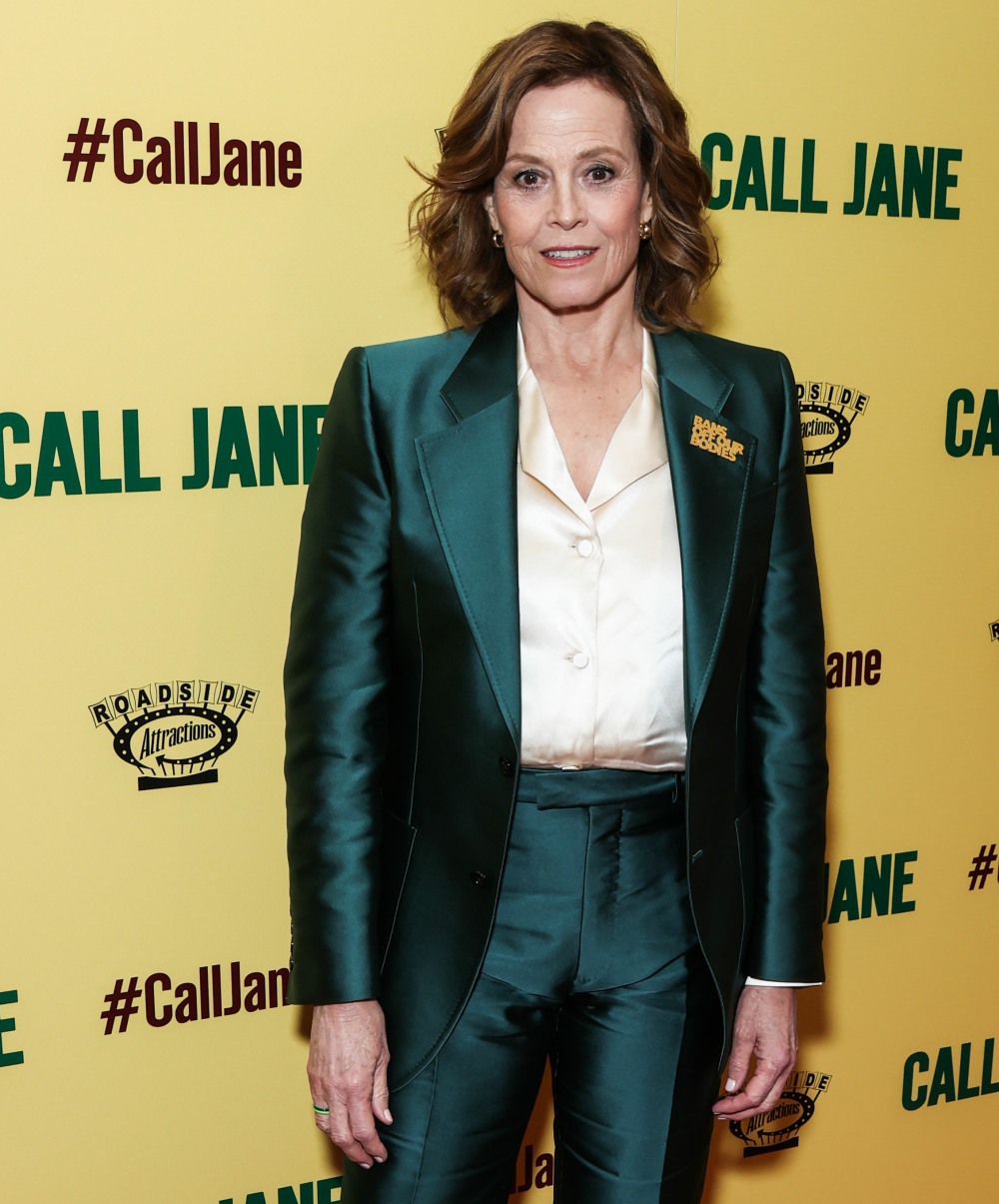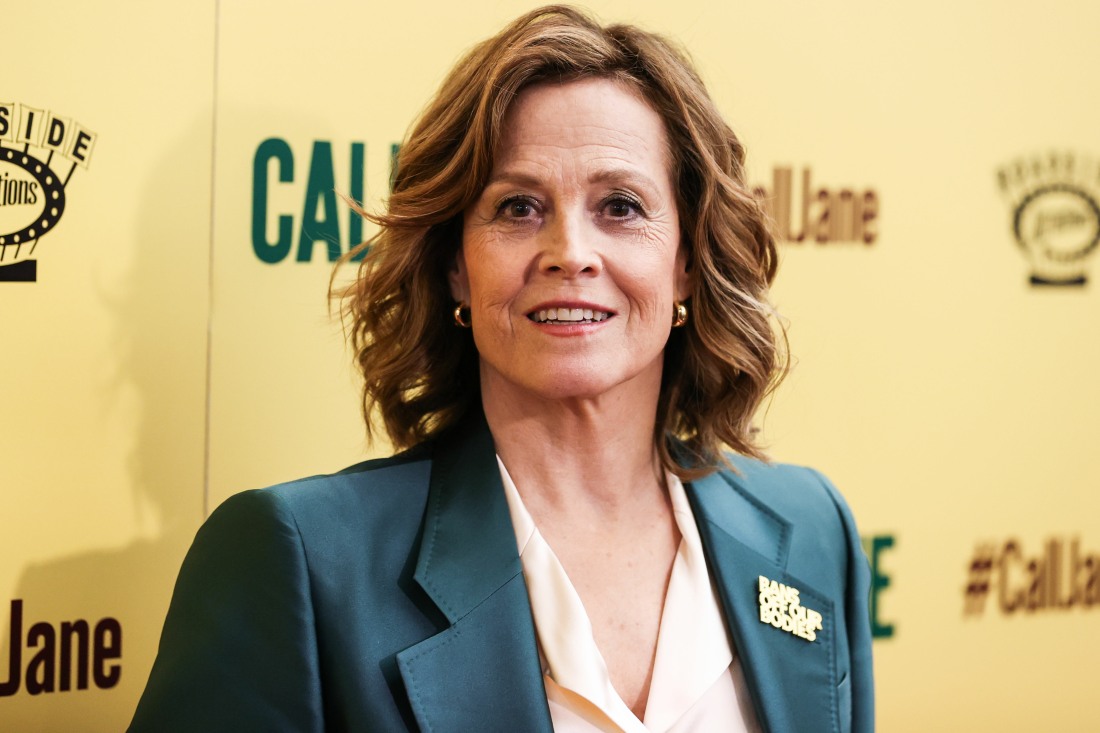Sigourney Weaver is having a good work year. She has several films coming out all in a row: The Good House, Call Jane, Master Gardener and James Cameron’s The Way of Water (the Avatar sequel). Currently, she’s doing a lot of promotion for Call Jane, which is a fictionalized story about the very real Jane Collective. The Jane Collective was an abortion-providing network before Roe v. Wade. The collective operated outside the laws of most states, but their goal was simply to provide safe abortions. Elizabeth Banks and Weaver are sort of co-leads – the story is told mostly through Banks’s character (a woman seeking an abortion) and then Weaver plays the head of the local chapter of the Jane Collective. Weaver recently sat down with Vanity Fair’s Little Gold men podcast and she talked about abortion and all of her upcoming films. Some highlights:
Why Call Jane is important to her: “I usually try to choose subjects that are close to my heart, and often the situation they may be describing is still going on. But I think Call Jane was especially important to me. I was alive before Roe v. Wade, and what’s missing in our big dialogue is just how much love and support and actual health care the woman needs, who’s in this situation. About a third of women now don’t have access to that kind of health care. But ultimately, I think Phyllis Nagy did a brilliant job taking you back into the experience of the woman. We see the procedure in a very discreet way. It reorients the argument away from politics to health care—which it is.
The situation isn’t hopeless: “I do think the movie is reassuring in reminding us that we are not helpless in this situation. Since Roe v. Wade was struck down, [there’s been] a lot of just absolute shock and alarm at the fact that these rights are stripped away. The movie just takes us back into a time when we were still in the same situation, but we were motivated to take action and come together, and we can’t look back. We have to look forward. The whole landscape has changed in terms of medication and everything else. The upbeat tone of the movie—I dare say my character is quite funny sometimes, and she’s very dry. There are actually a lot of laughs in the movie. So it’s a feel-good movie. It’s not a bleak movie.
Her ‘Call Jane’ character, Virginia: “A lot of women were somewhat sidelined in the anti-war movement because the men were the leaders. Virginia comes at this organization with all that pent-up energy that she never got to express and has really found her calling. She’s a very interesting leader. She’s good at listening—rare—and really wants to find solutions to some of the issues confronting them, like the access to health care for Black women, Latino, and indigenous, and LGBT women, which is a problem that existed then and still exists now.
How she sees her career now, at her age of 73: “I turn down a lot of things just because—listen, I feel very fortunate to be sent things, but I think I have been spoiled a bit, being able to do projects that are about something more than just the people in them. I think as one gets older, I look at Maggie Smith and I go, “She’s going on forever. That’s great.” I don’t know if I’ll do that. Sometimes I think I’ll run away to India and really learn how to do yoga or something. But I must say that for better or worse, I really love to work. I finally feel I kind of know what I’m doing.
Maybe I’m just desperate to hear something good and nice, but I feel like crying with relief that someone of Sigourney’s generation is saying, basically: it’s okay, we’ve been here before, we know what to do, we know how to fight, we’re not going back. It’s a fine line to walk – you want women to be outraged (justifiably) and you want everyone prepared to fight like hell to protect reproductive rights across the board, for everyone. But you also want to hear that we have a plan, we have tools, and maybe we have better resources now than we did pre-Roe.
Photos courtesy of Xavier Collin / Image Press Agency / Avalon.
- LOS ANGELES, CALIFORNIA, USA – OCTOBER 20: American actress Sigourney Weaver arrives at the Los Angeles Premiere Of Roadside Attractions’ ‘Call Jane’ held at the Skirball Cultural Center on October 20, 2022 in Los Angeles, California, United States.,Image: 732251468, License: Rights-managed, Restrictions: , Model Release: no, Pictured: Sigourney Weaver, Credit line: Xavier Collin / Image Press Agency / Avalon
- LOS ANGELES, CALIFORNIA, USA – OCTOBER 20: American actress Sigourney Weaver arrives at the Los Angeles Premiere Of Roadside Attractions’ ‘Call Jane’ held at the Skirball Cultural Center on October 20, 2022 in Los Angeles, California, United States.,Image: 732251477, License: Rights-managed, Restrictions: , Model Release: no, Pictured: Sigourney Weaver, Credit line: Xavier Collin / Image Press Agency / Avalon
- LOS ANGELES, CALIFORNIA, USA – OCTOBER 20: American actress Sigourney Weaver arrives at the Los Angeles Premiere Of Roadside Attractions’ ‘Call Jane’ held at the Skirball Cultural Center on October 20, 2022 in Los Angeles, California, United States.,Image: 732251548, License: Rights-managed, Restrictions: , Model Release: no, Pictured: Sigourney Weaver, Credit line: Xavier Collin / Image Press Agency / Avalon
- LOS ANGELES, CALIFORNIA, USA – OCTOBER 20: American actress Sigourney Weaver arrives at the Los Angeles Premiere Of Roadside Attractions’ ‘Call Jane’ held at the Skirball Cultural Center on October 20, 2022 in Los Angeles, California, United States.,Image: 732251557, License: Rights-managed, Restrictions: , Model Release: no, Pictured: Sigourney Weaver, Credit line: Xavier Collin / Image Press Agency / Avalon

















Fking A! Yes Sigourney Weaver! I’m angry because so many people were apathetic for so long, while the right wing minority never stopped working to strip our rights. This wake up call is already bloody with a human toll. But it IS a wake up call. Apathy pays dividends in the stripping of human rights. Now we fight.
Okay. I’ll say it. I am exactly Sigourney Weaver’s age and this is a very rosy spin on pre-Roe abortion access. The organization in the movie was not widely known at the time. It’s great that it existed and some women could access the care they needed. And it sounds like a good movie. But for most women at the time calling Jane or anyone else who wasn’t a butcher was just not an option. I’m all for looking on the bright side but when it comes to abortion access, pre-Roe or now post-Roe, it’s all pretty bleak. Everyone needs to vote! For pro-choice candidates only!
I think the huge difference now is that 1. Internet obviously increases access to information and 2. Women know a world with human rights.
Pre-Roe women couldn’t even get credit cards and mortgages on their own. Women have changed. That doesn’t explain the complacency that enabled this preventable public health crisis to occur, but even a forced pregnancy won’t turn women into Stepford wives and it won’t restore 1950s style white male privilege.
Sadly though it may very well create an underclass of unskilled laborers, which is also part of the economic plan here. Amazon is probably salivating at the possibilities.
I don’t want to suggest that women haven’t made enormous progress in some ways, but it’s hard for me to look at women’s situation today and see a glass half full. And something like the internet which should make a big difference in abortion access is subject to search warrants by the states that have passed the most oppressive laws. Women seeking abortion care can’t even use their personal phones without being very careful. It’s really amazing that the Jane Collective was able to help as many as it did at a time with no internet, no social media, and no cell phones. Yes! We really lived without these “essentials”. Don’t know how we did it. ¯\_(ツ)_/¯
*hugs* I was born a few months after Roe, and have lived a full life with all my rights to an age where unplanned pregnancy is just about the least of my concerns. But I’ve always had to imagine the struggle of women who didn’t have those rights, not the women who’ve had the rights stripped. I mean, I first read the Handmaid’s Tale in high school, but i thought it was kind of over the top. I really didn’t believe this could ever happen, I fought because I resented that it was such a huge part of the political narrative. The very discussion of whether women are entitled to bodily autonomy is demeaning. I’m still in shock over this unfolding horror, and I’m really scared about next Tuesday.
Check out Simon Rosenberg’s twitter feed. It will lower your blood pressure considerably. I promise! ♥️
Thank god for people like Sigourney Weaver speaking up for abortion rights. Sure it’s a bit of a rosy spin, I agree, but stories in the mainstream normalizing abortion experiences are few and far between and we need this right now.